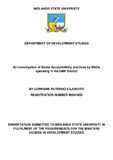Please use this identifier to cite or link to this item:
https://cris.library.msu.ac.zw//handle/11408/2867| Title: | An investigation of social accountability practices by NGOs operating in the UMP District | Authors: | Kajokoto, Lorraine Rutendo | Keywords: | Civic society Democratic systems |
Issue Date: | 2016 | Publisher: | Midlands State University | Abstract: | Civic society all over the world has been demanding formal democratic systems in states, where states are expected to be accountable to citizens. There is a tendency for development actors, mainly NGOs, to pressurise governments to exercise accountability, by advocating for, and, strengthening citizen voice and the engagement. Some NGOs tend to ignore their own accountability obligations to the communities and citizens they serve. Accountability as good governance means allowing people, in particular the poor and marginalized to have a say: in how they are governed; and in how decisions that affect them are made and implemented. Social accountability in the NGO sector is about: creating opportunities for information exchange, dialogue and negotiation between beneficiary communities and the NGO; the ability of NGOs to demonstrate accountability both to communities they serve and the government;; transparency and open information sharing, attitudes, skills and practices supporting listening and constructive engagement between the beneficiary community and the NGO as a service provider. Stakeholder participation as a key element of social accountability is meant to ensure good governance, based on a system of checks and balances. NGOs are not-for profit businesses, but still have to practice corporate governance, which is a system by which the organisations are directed and controlled. Since corporate governance is about improving business performance, there is need to place stakeholder participation at the centre of business strategy. A study was carried out in Uzumba Maramba Pfungwe District in 2016 to establish social accountability practices by NGOs in the district. The research population was 95 respondents selected from NGO management and board members; Officials in Government Departments that work with the NGOs; Officials in institutions that receive donor support; and Influential members of communities that receives NGO support. The study found that there were neither documented nor implied Social Accountability practices in NGOs. The research further concluded that there were no clear governance frameworks in NGOs, that guaranteed genuine and effective participation where all stakeholders could have a voice in decision-making, either directly or through legitimate intermediate institutions/sub-structures that represented their interests | URI: | http://hdl.handle.net/11408/2867 |
| Appears in Collections: | Master Of Arts In Development Studies |
Files in This Item:
| File | Description | Size | Format | |
|---|---|---|---|---|
| Kajokoto.pdf | Full Text | 1.51 MB | Adobe PDF |  View/Open |
Page view(s)
120
checked on Apr 27, 2025
Download(s)
88
checked on Apr 27, 2025
Google ScholarTM
Check
Items in MSUIR are protected by copyright, with all rights reserved, unless otherwise indicated.



